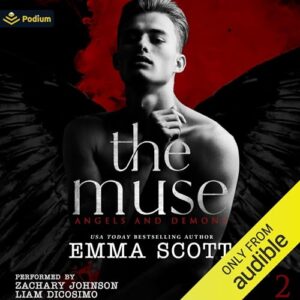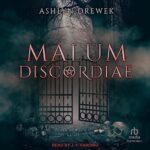Narrated by Zachary Johnson & Liam DiCosimo
The first thing that caught my eye about Emma Scott’s The Muse was Zachary Johnson’s name on the cover; the second was the blurb, which promised a dramatic and angsty story about the battle for the soul of a young artist. It’s book two in the author’s Angels & Demons series, and although there are a small number of recurring characters, this is a new story in which they have secondary roles, so it works, more or less, as a standalone.
Paris, 1786. Ambrosius Edward Meade-Finch, a young English nobleman, is caught up in the affaire du collier de la reine (the Affair of the Diamond Necklace) when he discovers the man he loves has been merely dallying with him while plotting with his lover, Jeanne, to steal the necklace. Heartbroken, Ambri gets roaring drunk and shoots his mouth off in front of an angry mob who fling him into a burning building and lock him inside. As the smoke swirls and the flames rise, Ambri hears a smooth voice addressing him and turns to find a man sitting on a nearby crate, his white suit untouched by soot, his flowing dark hair crowned by an equally pristine white hat. Ambri instinctively knows that this is no man and he’s right; the demon Ashtaroth offers Ambri a new existence, one in which he will remain young and beautiful for ever and will be able to take his revenge on the humans who have so carelessly dismissed and disregarded him over the years by making them slaves to their desire for him. Bitter, angry, desperate and terrified – Ambri accepts.
In present day London, we meet Cole Matheson, an American artist and graduate of the Royal Academy of Arts, who is still waiting for his big break. He’s very talented, but while friends he graduated with are beginning to make names for themselves, he’s stuck working in a pub, living in a shitty flat and getting nowhere. He’s assailed by crippling self-doubt and falling into depression – and as if that’s not bad enough, he returns home after work one night to find he and his flatmates have been served with an eviction notice.
The demon Ashmodai has become Ambri’s liege lord following the destruction of Ashtaroth (in book one, The Sinner) when Casziel, the Nightbringer, fell in love with a human woman and broke his demonic bonds. Ashmodai suspects Ambri’s loyalty (with reason – Ambri did help Casziel) and commands him to prove himself by driving a human to the ultimate despair, persuading them to “end their miserable existence” – and then bringing them across the veil to him. Ambri has no particular liking for humans, and driving one to take their own life is not something he looks forward to doing – but it’s that or eternal agony, so he chooses his victim. Still smarting at the loss of Cas to the human world and his love, Lucy, Ambri decides to extract a little revenge. Lucy’s best friend, Cole, lives in London; his downfall will please Ashmodai and bring pain to Lucy and thereby to Cas. Perfect.
When Ambri finds Cole, standing on Blackfriars bridge staring down into the dark water, he knows he’s found him at an all time low. He can see the demons Deber and Keeb (who induce feelings of despair, failure and self-loathing in humans) are never far away, and thinks, at first, that bringing Cole down will be easy. But he realises he doesn’t want ‘easy’, and decides it will be far more of a challenge – and thus more of a triumph – if he builds Cole up first, if he takes him to the heights of fame and success and then crushes his spirit and plunges him into deepest despair. He becomes both patron and muse to Cole, allowing him to paint him in his demon form in return for a portrait depicting him in his human form that could sit beside those of his family at Hever Castle. (*snort* – really?)
Of course, we all know what happens to the best-laid plans. Before long, Ambri finds it impossible to resist Cole’s good heart and the unconditional love and affection he is offering; he almost can’t believe it, but Cole sees everything Ambri is and loves him anyway. And Cole, who is smitten with Ambri’s beauty the from the first, is falling hard for this complicated, damaged individual who deserves so much more than life – and the afterlife – have given him.
The premise of The Muse – a struggling artist meets a broodingly beautiful demon who becomes his artistic muse and the love of his life; the demon wreathed in darkness meets a truly good and generous man who loves him exactly as he is – is a really good one and I had high hopes for the story – but sadly, they were not met. The author does some things really well; Cole’s doubts and fears and his descent into depression feel very real, and I felt for Ambri, who has gone through some truly traumatic shit and who, despite being well aware of his physical beauty, has learned through bitter experience that he’s not the sort of person others fall in love with or want to keep around. But the biggest problem with the book is that it’s not sure what it wants to be. It tries to be dark and angsty, but isn’t; it has a lot of dark themes, and should feel weightier than it does, but it’s a odd mix of dark and fluff. Cole is likeable but bland, although I did like the way he refused to let Ambri turn away from the love and affection he wants to give him, and while Ambri is the more interesting character of the two, he’s not so much demonic as he is bitter and sharp-tongued. I assume that over the three hundred or so years of his existence he must have done some really bad stuff, but we never see any of it, so I never really believed he was ever going to go through with his plan to ruin Cole. (It reminded me of all those ‘rogues’, ‘scoundrels’, ‘rakes’ and ‘devils’ in historicals who are never seen behaving badly on the page!)
The chemistry between Cole and Ambri is decent, but the romance is pretty insta-love-y. There are a couple of moments that tug at the heartstrings in the later part of the book, but for a novel billed as an “emotional” romance, I didn’t feel there was much of an emotional connection between the characters, and I never felt connected to them either. I enjoyed the final chapters the most – Ambri has always known he doesn’t have infinite time to comply with Ashmodai’s demands, and as he realises he’s running out of time to save Cole the pacing picks up and things start to get really interesting – only for the climax to be rushed and more of a damp squib than fireworks. And the reveal of the guardian angel is overkill.
The narration is very much a story of two halves. Zachary Johnson narrates Ambri’s chapters – so about 40% of the story – and he’s fantastic. He captures every facet of the character – the bitterness and anger, the wry humour and passion, the fears and vulnerability he’s hidden for so long, and the depth of his affection for Cole. In the prologue, he’s downright scary as Ashtaroth; the English accent he adopts for Ambri is almost perfect and the other accents he uses are pretty good, too. The problem is that although Liam DiCosimo is great as Cole, he’s not great at just about everything else. While the English accent he uses for Ambri’s dialogue is okay, when he tries to “bloke” it up a bit and deviate from RP, he sounds like he’s fresh out of the Dick van Dyke School of English Accents. (The book actually begins with some dialogue from Cole’s friend Vaughn, and it was so bad I almost switched off. ) His other accents aren’t great either, but the biggest problem is his interpretation of Ambri, which is totally one-note. There’s none of the mercurial moods or sexy playfulness that Mr. Johnson conveys so well; instead, Mr. DiCosimo’s version of Ambri sounds like a bluff, fifty-something professor whose default emotion is vague amusement. Ambri is supposed to be a perpetually gorgeous twenty-four-year-old sex-bomb who can send people mad with desire; all I felt when Ambri spoke in Cole’s chapters was the desire to offer to find his pipe and slippers or make him a cup of tea.
I’m not generally a fan of dual narrations for the exact reason the narration doesn’t work here – when you get one narrator who is simply not in the same league as the other, it ruins the listen. Zachary Johnson is more than talented enough to have been able to narrate this story solo, and although he couldn’t have disguised its weaknesses, he’d have made the whole thing a much more enjoyable listening experience.
Caz
Buy The Muse by Emma Scott on Amazon





I totally agree with your assessment of dual narrators. I guess I see it for m/f romances, but even then I generally prefer one good narrator. There are some great examples of dual narrations in m/m that work, but many more that are disappointments because of the situation here–one narrator isn’t up to snuff. I really enjoy Zachary Johnson’s narrations of the Nazri Noor books and would be happy to listen to him solo on other books. I hate it when I check out an Audiobook and see a narrator I enjoy paired with one I know will tank it for me because it means I miss out not a potentially good audiobook, but a chance to listen to a favorite narrator.